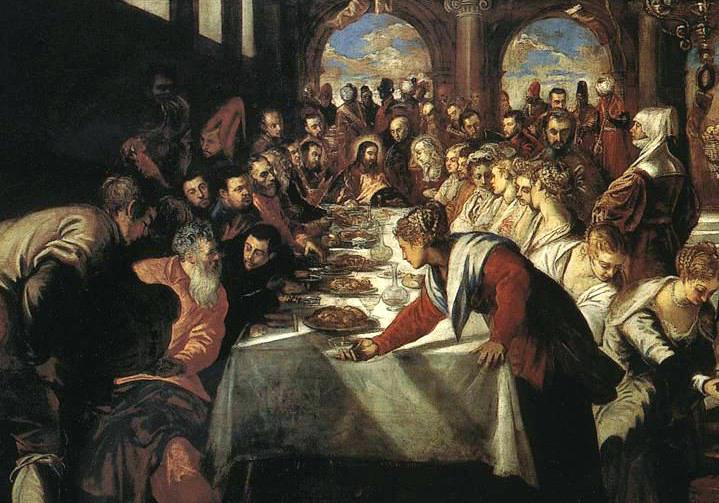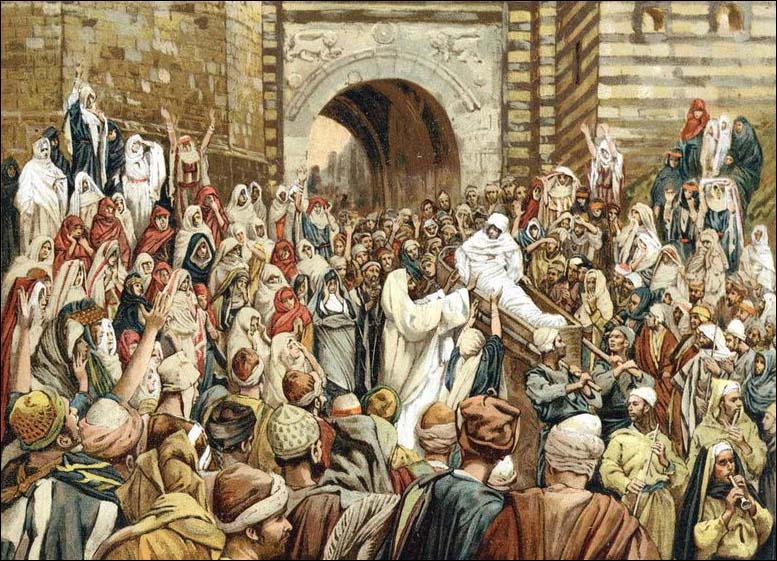September 23, 2018
“For everyone who exalts himself will be humbled, and he who humbles himself will be exalted.” These words are repeated in one form or another several times throughout the holy Scriptures, including from our Lord’s mouth a number of times. The mother of our Lord, the Virgin Mary herself spoke such words in her Magnificat, when she rejoiced for the child in her womb, saying, “He has brought down the mighty from their thrones and exalted those of humble estate.” And in her song, Mary expresses nothing more than what is consistently repeated in Scripture. Psalm 113 articulates it well, “He raises up the poor out of the dust and lifts the needy out of the dunghill; that he may set him with princes, even with the princes of his people.” (vss. 7-8)
And what Jesus is teaching with this statement is nothing short of the hope that all we Christians cling to: we are saved by grace apart from our works. He who exalts himself will be humbled. Who will humble him? God will. God casts down the mighty from their thrones and humbles the proud. He who humbles himself will be exalted. Again, who will exalt him? God will. God exalts the humble, that is, those who claim the lowest place at the banquet. God exalts those, who claim nothing from their works, but rely purely on God’s grace.
Exalting yourself before God is a foolish thing to do. While you might be able to convince others that you are great or even convince yourself that you are righteous, God cannot be fooled. He searches the innermost heart of man. He who searches the mind of God and knows his inner thoughts certainly can search you and find any blemish there is to find. And we all know there is plenty for the Lord to find wrong with each of us.
So, it is foolish to exalt yourself, yet that does not mean that people don’t try. In fact, it’s quite difficult not to exalt yourself. Humbling yourself is much more challenging. Because, to humble yourself you must rely solely on God to elevate you to a proper place. Fear creeps in, “What if God doesn’t exalt me? Will I be stuck at this miserably low spot?” And that is why people try to exalt themselves. They trust in themselves that they can get a better spot at God’s banquet. And they don’t trust God to give them an adequate spot.
So, you see, to humble yourself takes faith. To humble yourself, you must trust that God will lift you up. Those, who refuse to humble themselves lack faith that God will exalt them. Those who do humble themselves trust in God, that he will give them a greater position in his Kingdom than anyone could dream for himself.
St. Paul teaches us how to have such faith. He writes in Philippians chapter 3, “Indeed, I count everything as loss because of the surpassing worth of knowing Christ Jesus my Lord. For his sake I have suffered the loss of all things and count them as dung, in order that I may gain Christ and be found in him, not having a righteousness of my own that comes from the law, but that which comes through faith in Christ, the righteousness from God that depends on faith.” (3:8-9) St. Paul, who certainly could claim much higher works than any of us, does not count any of them toward his credit or boast to sit at a higher seat. Rather, he trusts that God raises the needy out of the dung heap and, having washed them all clean, sets them before princes.
Now, how can St. Paul do this? How can he so readily let go of his good works and take such a lowly spot for himself? Because he has faith that God has instore for him a much greater position than he could ever gain from all his works. Again, St. Paul writes in 2 Timothy 4:8, “Henceforth there is laid up for me the crown of righteousness, which the Lord, the righteous judge, will award to me on that day, and not only to me but also to all who have loved his appearing.”
That God exalts the humble means that God saves sinners by grace apart from their works. But to humble yourself to receive such grace takes faith in God’s promise to exalt you. Therefore, grace and faith cannot be divorced. To be saved through faith means that you are saved by grace.
Now, how lowly must you humble yourself, so that you can be exalted by God? Jesus says in Matthew 18, “Whoever humbles himself like a child is the greatest in the kingdom of heaven.” Yet, truly, we must humble ourselves even lower, yes, even to death. Unless your sinful old Adam die, so that you can be raised again to new life by the Holy Spirit, you cannot be saved.
Our pride tries to save our old Adam. We want to say there is still something good in us that we can show to God, so that we don’t have to trust solely on his grace. But God says, “No, you can’t save the old Adam. He must be drowned. He must be crucified with Christ and be destroyed.” And this is why we return each week with the same confession, “I, a poor miserable sinner, confess unto you all my sins and iniquities...” The old Adam continues to rise again. This is why St. Paul writes in Romans 7, “I know that nothing good dwells in me, that is in my flesh.” And again, he writes in Colossians 3:
“For you have died, and your life is hidden with Christ in God. When Christ who is your life appears, then you also will appear with him in glory. Put to death therefore what is earthly in you: sexual immorality, impurity, passion, evil desires, covetousness, which is idolatry. On account of these the wrath of God is coming. In these you too once walked, when you were living in them. But now you must put them all away: anger, wrath, malice, slander, and obscene talk from your mouth. Do not lie to one another, seeing that you have put off the old self with its practices and have put on the new self, which is being renewed in knowledge after the image of its creator.” (3-11)
So, we learn that we must die every day and take the lowest spot with full confidence that God will raise us up again through faith in Christ.
You can have such confidence that God will exalt you, because Christ Jesus humbled himself, even to the point of death on the cross. He had the right to claim equality with God, yet he took the position of sinners for your sake. And God has highly exalted Jesus, who plunged himself into the mire of your sins and into the pit of hell, as he suffered the consequence of your sins on the cross. Jesus did this confident that God would raise him from the dead and place him above all things. So, when you humble yourself by repenting of your sins and claiming nothing in yourself to earn your salvation before God, you join yourself to Jesus’ death. You trust that if you have died with Christ through faith and through Baptism, that God will surely raise you from the dead, just as he raised Christ Jesus.
Humbling yourself is scary if you don’t know if you will be lifted up. But when you look to Christ, who has been exalted by God, even after being smeared with all your sins, then you have confidence that you too will be raised. Christ is your assurance that God will tell you to move up higher. Your Baptism is a token that you can remember even now, your own personal rainbow in the sky, which assures you of God’s promise. When Jesus tells you to humble yourself, he is not telling you to grovel before the hangman in a last-ditch effort to spare your life. He is telling you to take off your dirty robes and trust that God will give you a princely robe. Trust not in yourself, but in God, who has promised you every good thing through the merits of Jesus Christ alone.
Through humility, you learn that God deals with you by grace, not according to your own works. This grants you great peace with God now and for eternity. Yet, humility also creates peace and unity here in the church on earth. When each person considers the other more significant than himself, peace is sustained. St. Paul writes in our Epistle lesson, “walk in a manner worthy of the calling to which you have been called, with all humility and gentleness, with patience, bearing with one another in love, eager to maintain the unity of the Spirit in the bond of peace.”
Humility, bearing with one another’s burdens helps maintain the unity of the Spirit in the bond of peace. How easy it is to think of others and their need to repent when you hear the law preached. Yet, God wants you to examine yourself and think of your own need for repentance. Do not seek out the sins in others, but seek out the sin in your own heart, so that you can repent and be filled with the Holy Spirit. When you consider that your place in God’s kingdom is a pure gift given to you by grace, not on account of your own goodness, you cannot boast to be a better Christian than the other soiled lambs, who come to be cleansed in Jesus’ flock.
Humility leads us to forgive the fault in others, to strive for unity in Christ and not force our own ways upon others. When we trust in God’s grace alone on account of Jesus’ merit, we have no need to tear others down so to make ourselves look better. God will lift each of us higher than we could ever imagine for ourselves. And so, it should be a joy to lift others up now, knowing that we lose nothing from it.
When you rely on God’s grace you are able to focus on loving your neighbor. The Pharisees were offended that Jesus broke the Sabbath to heal someone, because they did not know that the law is subordinate to love. They used the law only to advance themselves, so that they could establish for themselves a higher seat at God’s table. But the law was given, that we might love our neighbor. Jesus fulfilled the law of the Sabbath by loving his sick neighbor. But this can only be understood if you yourself have received God’s love. This can only be done through faith when you humble yourself to receive God’s love.
He who exalts himself will be humbled, but he who humbles himself will be exalted. These are terrifying words to those who trust in themselves. But for us, who fear the consequence of our sins and trust in Jesus, these are the most comforting words we can hear. These words are a promise from God that he will exalt us, who trust in Jesus and not in ourselves. May we always believe this promise until God lifts us up to dine with him on the Last Day. Amen.




 RSS Feed
RSS Feed